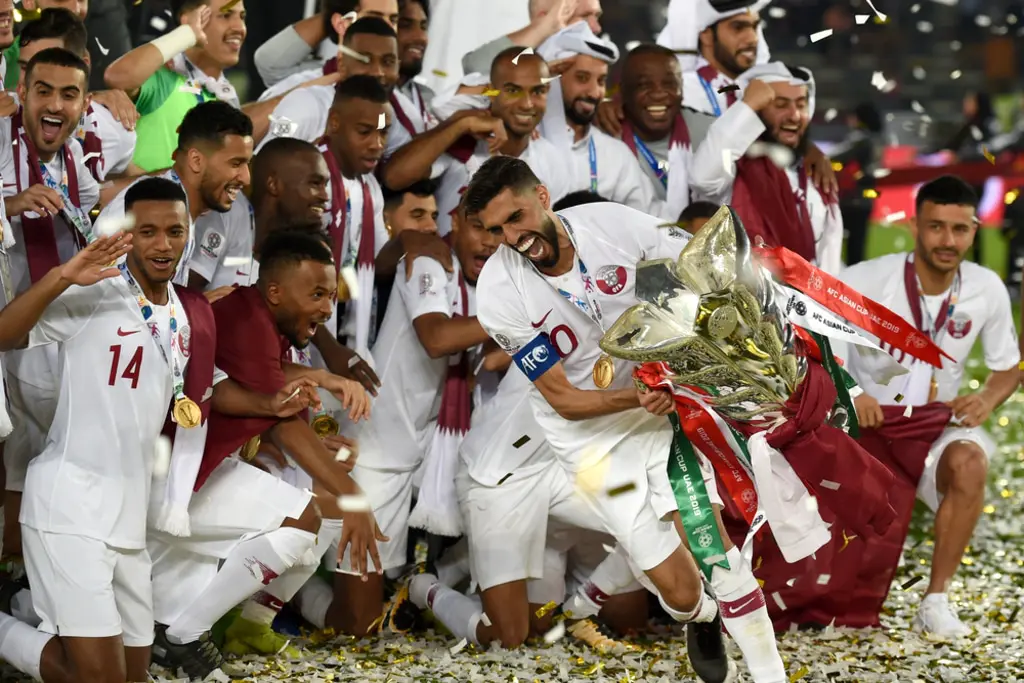
In 2011, Qatar won the bid to host the 2022 FIFA World Cup. Against the odds, the tiny, oil-rich state also won the 2019 Asian Cup in February. These victories show the grip Qatar has managed to gain on world football in recent years.
Qatar defeated Japan 3-1 at the event in the United Arab Emirates (UAE) to become continental champions for the first time and in its first final appearance. The US-based sports channel ESPN described the Qatari team as young, fast and willing. ‘Given the ages of those involved, it should only get better and be coming to the boil nicely by the time the 2022 World Cup comes around.’
But Qatar’s win is not just about Qatar. As Reuters put it in an article on 2 February, ‘Qatar running rampant to secure a maiden Asian Cup title in Abu Dhabi might have been the worst-case scenario for the hosts, but it also offered hope for Gulf football that the 2022 World Cup might not now be a humiliating experience for the region.’
In December 2018, Gianni Infantino, Sepp Blatter’s successor as FIFA president, said during a speech to the G20 leaders, “Football can bring us together and make the world a more prosperous, educated, equal and perhaps even peaceful place.”
Nothing could have been further from the truth at the Asian Cup, where the UAE, with which Qatar is currently embroiled in a diplomatic standoff over its alleged support for terrorism, tried to stop Qatar fans from attending games and reportedly arrested a man for wearing a Qatar shirt. The UAE’s football association also questioned the eligibility of some of Qatar’s players, including the tournament’s top goal scorer Almoez Ali, but their complaints were dismissed by the Asian Football Confederation, the sport’s regional governing body.
Sports in the Gulf have become a political battleground, as Simon Chadwick, professor of sports enterprise at Salford University in the United Kingdom, explained to Fanack in October 2018. “Qatar has been investing heavily in the field of sports for more than ten years now because it is a way to raise its profile and global visibility, build a sustainable market, exercise soft power, create a national social cohesion and tackle diabetes through exercise. Qatar is taking sports seriously, which culminated in its nomination to host the 2022 World Cup. It already hosts yearly competitions like the World Athletics Championship and has become something of a sports event destination.”
Qatar’s team has been built from scratch, with no expense spared to make it successful. Its head coach Felix Sanchez brought in players from the Aspire Academy and Qatar’s youth sides, creating one of the youngest squads at the Asian Cup. Star players Almoez Ali and Akram Afif will be approaching their peak when Qatar hosts the World Cup.
Sanchez is a Spanish football manager who started his career with FC Barcelona before heading to Qatar and the Aspire Academy, founded in 2004 with the goal of scouting and helping develop Qatari athletes while also providing them with secondary education. He has proved his worth by winning the 2014 AFC U-19 Championship. However, to build a strong team, he had to go abroad. Thirteen nationalities besides Qatari make up the national team, including 11 Africans, mainly from Sudan.
FIFA’s eligibility rules state that a player must have ‘lived continuously for at least five years after reaching the age of 18 on the territory of the relevant Association’, which pushed Qatar to give Qatari nationality to most of its players. The UAE, Qatar’s Asian Cup semifinal opponent, which Qatar beat 4-0, lodged a complaint after the match claiming that two players were not eligible to play. The Qatari football association’s lack of response has only raised more eyebrows, and FIFA’s deferral on the matter to the Asian Football Confederation suggests it might turn a blind eye as the World Cup approaches.
No exact numbers could be found for Qatar’s investment in its national team or in preparations for 2022. However, according to the Middle East Economic Digest (MEED), Qatar will spend $100 billion just on infrastructure linked to the tournament. From the start, the government laid out a massive investment programme, with Finance Minister Ali Shareef al-Emadi saying in February 2017 that Qatar was investing $500 million in infrastructure each week. Qatar also wants to develop the local sports sector and to attract more foreign sports companies, with the aim of developing a $20 billion industry ahead of the World Cup, a senior official said.
The country currently stands at 93 in FIFA’s world rankings, one spot behind Trinidad and Tobago and just ahead of Benin, while the UAE stands at 98. According to the British newspaper The Independent, ‘The [Qatari] national team has impressed at [the Asian Cup], standing out even by comparison with Asian aristocracy, such as Japan,’. It added, ‘This suggests the country’s talent acquisition and development strategies are delivering their intended outcomes. Whatever you think about player harvesting, measures such as the creation of the Aspire Academy on the outskirts of [the capital] Doha and the purchase of Belgian club KAS Eupen (as a vehicle through which to hone Qatari players’ skills) are bearing fruit.’
Over the past decade, Qatar has also invested heavily in football abroad, funnelling $1.6 billion since 2012 to mega-franchises such as France’s Paris Saint-Germain FC and FC Barcelona in Spain. It looks like investing in sports might be a way not only for Qatar to brand itself outside of the Gulf region but also to secure income in a world where oil revenues are predicted to decline.
2022 is Qatar’s first selection for the World Cup, a place it was given as the host, and the first chance the country will have to prove the strength of its grip on football on the global stage.


